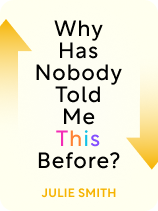

This article is an excerpt from the Shortform book guide to "Why Has Nobody Told Me This Before?" by Julie Smith. Shortform has the world's best summaries and analyses of books you should be reading.
Like this article? Sign up for a free trial here.
How skilled are you at objectively assessing the negative feedback you get? Do you know how to use it to your advantage? Or, does negative feedback just make you want to crawl into a hole?
Negative feedback is hard. Perhaps you’ve experienced the shame that can accompany performance appraisals, customer reviews, captive audiences, or frank conversations with loved ones. But, there’s a way to find value in what people think of you, even when it stings.
Continue reading to get advice on how to accept negative feedback from Dr. Julie Smith, Brené Brown, and Dale Carnegie.
How to Accept Negative Feedback
Everyone experiences criticism and disapproval from others, so it’s important to build the skills to tolerate it. This doesn’t mean we should force ourselves not to care what others think. That would be an unrealistic goal, as we are social beings. Rejection threatened our survival for most of human history, so criticism can still bring up strong feelings.
(Shortform note: Rejection threatened our survival for most of human history because our ancient ancestors lived in small, nomadic groups that relied on cooperation and social acceptance for survival. Being rejected from the group meant losing access to food, shelter, and protection, and it could even lead to death. That’s why when we’re rejected, our brains release hormones such as cortisol and adrenaline, which trigger the survival mechanisms of our nervous systems.)
When other people’s criticism focuses on something we did, we may feel guilt, prompting us to reflect and change our behavior. When criticism focuses on who we are, we feel shame.
(Shortform note: In Daring Greatly, Brené Brown explores the differences between shame and guilt as well as embarrassment and humiliation. She writes that shame impacts our sense of worthiness for love and belonging—it tells you that you’ve done a bad thing and you are a bad person. Guilt says you’ve done a bad thing, but it doesn’t feel like you’re a bad person for it. Humiliation happens when you’re treated badly for something but feel you don’t deserve it. And you feel embarrassed when you’ve done something that makes you feel bad, but you know it wasn’t truly terrible and that others have experienced something similar.)
Shame is a painful experience, and Smith explains that the key to staying calm in the face of negative feedback is to build shame resilience. Shame resilience helps us stay calm, assess feedback, incorporate it if it aligns with our values, and move on without it harming our sense of worthiness.
To build shame resilience, Smith first recommends reflecting on what causes you shame the most—your appearance or intelligence, for example. If someone’s negative feedback hits you hard and you find yourself ruminating about it, try to interrupt the repetitive thoughts by redirecting your attention.
(Shortform note: In The Gifts of Imperfection, Brené Brown explains that being shame resilient means having a strong sense of worthiness. She recommends the following additional strategies for developing shame resilience after you identify what triggers your shame: Assess why those particular things trigger your shame—are you trying to meet unrealistic standards set by others? Talk to trusted loved ones about your experience of shame, as airing those feelings can stop them from festering and growing. Lastly, try to avoid unhealthy coping strategies for shame like isolating yourself or trying too hard to please others, because these behaviors will not help you believe in your inherent worth.)
If you can stay calm after receiving negative feedback, you may see it as an opportunity to learn and grow. To take criticism productively and use it to your advantage, Smith encourages you to stay on your own side and not kick yourself when you’re down. It’s also essential to assess whether the feedback is relevant to you—does the opinion of the person who criticized you matter to you? If not, try to let it roll off your back.
(Shortform note: In How to Stop Worrying and Start Living, Dale Carnegie agrees with Smith that the most effective way of grappling with negative feedback is to view it as a learning opportunity, but he refutes her claim that being more receptive to criticism requires that you stay on your own side. Instead, he argues that being critical of yourself and your work helps you prepare for criticism from others and learn from your mistakes privately. However, Carnegie does concur that assessing whether negative feedback is legitimate and justified will help you stay grounded emotionally and use criticism constructively.)

———End of Preview———
Like what you just read? Read the rest of the world's best book summary and analysis of Julie Smith's "Why Has Nobody Told Me This Before?" at Shortform.
Here's what you'll find in our full Why Has Nobody Told Me This Before? summary:
- Practical tips for managing difficult emotions and thoughts
- Why self-compassion is key to mental health and how you can cultivate it
- How to change your relationship with failure






